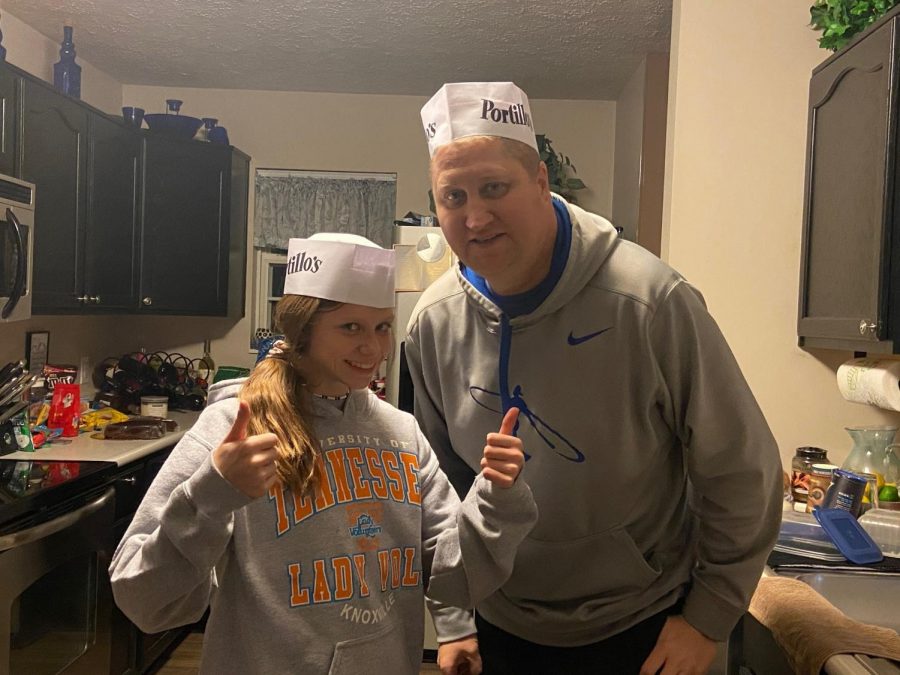Coping with COVID: Students at NHS learn how to cope with living alongside high-risk relatives during the ongoing pandemic
September 30, 2020
For the first time in what felt like forever, the world stood still as pure and utter silence fell upon the formerly bustling cities. What was once a crowded marketplace is now an empty abyss; highways lie stagnant; and the occasional person is seen walking lonesome, seldom removing the cover that shields their face. Everything stands still, yearning to sense the comforting feeling of the world turning yet again. Welcome to the unpredictable and downright dreadful time that is sure to make its way into future history books: the year of 2020. This year has offered a rather apocalyptic world — a world that is nothing more than unlively, lonesome, and damaged due to the ongoing pandemic classified as COVID-19.
After roughly seven months of living in such a world, everyone — especially those with high-risk family members — must learn how to properly function in this new reality. Many NHS students, too, were forced to accommodate this unfamiliar and faulty lifestyle full of struggles they never expected to come face-to-face with.
For junior Haley Winter, COVID-19 proved itself to be a force that dictated her new day-to-day life. Being in constant contact with a mother possessing two auto-immune diseases, a father with a previous record of heart attacks, and her two grandparents, Winter was forced to take precautions in order to keep her family in good health. In turn, Winter had to endure the hardships that came alongside such peculiar circumstances.
“When all of this started [back in March], I would get home from school and […] have to take off my shoes outside, spray them down with Lysol, go inside and immediately take off all of my school clothes, throw them in the washer, [and] take a shower,” Winter said.
Although those without high-risk family members might tend to be more careless when it comes to COVID-19, junior Cole Melton — whose two younger brothers are high-risk due to asthma — wholeheartedly believes that even those without high-risk complications should take the proper precautions to stop the spread of the virus.
“I understand that some people may not care if they get COVID because it’s just going to be a one-week flu experience [for them], but it’s really important for us to consider the implications of our actions,” Melton said.
COVID is oftentimes misinterpreted to only be as severe as the cold or flu, but for high-risk families, it is so much more than that. It can be life or death.
“Both of my parents could die — my whole family could die. We’re out here trying to protect our families, [and some] people really just don’t get it,” Winter said.
Working in an ICU at a local hospital, Noblesville High School nurse Sandy Burnette was given the opportunity to learn information about COVID-19 and its effects.
“COVID-19 is thought to spread through respiratory droplets from person to person. Wearing a mask helps decrease the amount of respiratory droplets we exhale,” Burnette said, “When we do not wear a mask, the droplets can be inhaled by others within close contact of us.”
Burnette states that “high risk individuals have a greater risk of getting really sick if they contract the virus”
Due to this, those living alongside high-risk people stayed at home more often than those without.
Sophomore Reis Sjoholm, whose father is battling cancer, was one of these students who had to be confined within her home throughout the duration of quarantine.
“Although most people were understanding [of my circumstances], I felt a lot of anger because I just wanted to hang out with friends, even though I knew I couldn’t,” said Sjoholm.
As if distancing from friends and extended family wasn’t enough, Winter was burdened with yet another misfortune.
Quarantine was “very stressful … because my grandpa died — not from COVID — and so, we were in and out of the hospital; he was on the COVID floor,” Winter said, “and we would get really scared about one of us getting COVID.”
Melton thinks it’s interesting to learn how different people responded to quarantine.
“I think I learned a lot about how different people will behave when facing the same challenge … it was really interesting to see who was understanding of [the fact that] I have to stay home — that I can’t go out and do a whole bunch of things with people,” Melton said.
Burnette believes that teenagers need to understand that they have the ability to determine the future of COVID’s course of action.
“As students, your actions outside of school matter. Avoid large gatherings, sleepovers, and situations where you cannot social distance,” Burnette said. “Wash your hands frequently [and] if you are sick, stay home.”




